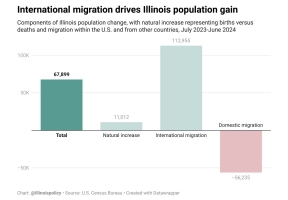By Maria Pappas
 Amid increasing concerns that rapid increases in property tax bills will drive people from their homes, state officials are boosting a program that lets senior citizens defer paying their property tax bills. I support this program. Recent changes may make some older homeowners more likely to consider the Senior Citizens Real Estate Tax Deferral Program. The program works like a loan. The homeowners “borrow” money to pay property taxes from the state, which pays the tax bills and charges 3% simple annual interest.
Amid increasing concerns that rapid increases in property tax bills will drive people from their homes, state officials are boosting a program that lets senior citizens defer paying their property tax bills. I support this program. Recent changes may make some older homeowners more likely to consider the Senior Citizens Real Estate Tax Deferral Program. The program works like a loan. The homeowners “borrow” money to pay property taxes from the state, which pays the tax bills and charges 3% simple annual interest.
A participant who defers $2,000 in property taxes would owe the principal amount plus $60 after a year. If the tax bill remained unpaid, the interest owed would increase to $120 after two years and $180 after three years. Deferred taxes must be repaid immediately upon the sale or transfer of the property or within a year of the taxpayer’s death.
To satisfy eligibility requirements homeowners must:
• Be age 65 or older by June 1 of the year the application is filed
• Have an annual household income of $65,000 or less
• Have lived in the home for the last three years
• Have no delinquent property taxes or special assessments due
• Have adequate insurance against fire or casualty loss.
The program allows qualifying senior citizens to defer up to $7,500 a year in property taxes. If a homeowner defers the maximum amount but the tax bill exceeds $7,500, the homeowner is responsible for paying the difference. My website, cookcountytreasurer.com, has details about the Senior Citizen Real Estate Tax Deferral program and how to apply. Details are available on a page found under the “Seniors” tab at the top of the home page. The page also contains a link to a downloadable brochure about the program. The page includes an application that may be downloaded and printed. Applications for 2025 will be available after Jan. 1 and must be submitted by March 1. State law forbids extensions on the application period. First-time applicants must provide:
• Proof of age
• Social Security number
• Proof of ownership of residence
• A copy of homeowner’s insurance with evidence of payment
Lawmakers recently cut the interest rate in half, to 3%. Participants who previously enrolled in the program were charged 6% annual interest for tax years 2022 and earlier.
Lawmakers also increased the amounts of maximum deferment and income eligibility temporarily, through the 2025 tax year. The maximum deferment amount was increased from $5,000 and the annual income threshold for eligibility was raised from $55,000.










